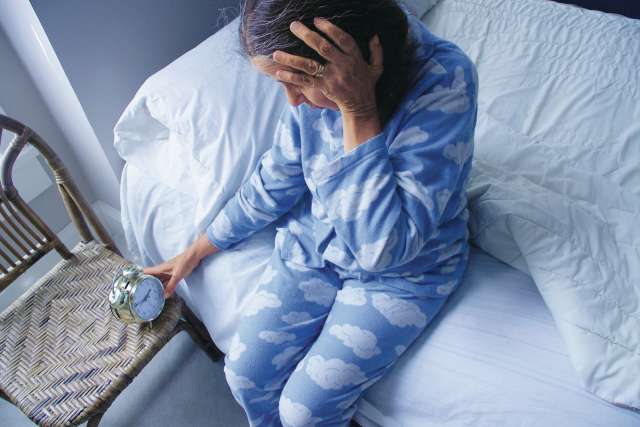One of the hallmarks of aging is difficulty getting to sleep and staying asleep. On average, younger adults may wake up briefly five times a night. But some people over age 60 may wake up as many as 150 times while sleeping.
Insomnia has far more serious consequences than feeling groggy in the morning – it can also lead to depression, with lack of sleep doubling the risk.
As depression is more common for those with chronic health conditions, such as heart disease, cancer or diabetes, older adults may be at increased risk.
Research led by Michael Irwin, MD is the first to examine the mechanisms of the interaction between insomnia and depression in seniors. The study found that older adults who are chronically sleep deprived not only are at greater risk, but symptoms are worse and more prolonged.
“Older people who have insomnia show a very exaggerated risk of becoming depressed,” said Dr. Irwin, the Norman Cousins Distinguished Professor of Psychiatry and Biobehavioral Science at the David Geffen School of Medicine at UCLA.
“The data are just really remarkable: it’s a several-fold greater increase in the incidence of depression. And the longer the insomnia lasts, the greater likelihood of becoming depressed, even for those who have never been depressed before.”
Insomnia, inflammation and depression
Inflammation can also lead to depression, and Dr. Irwin and his collaborators have found that an “inflammatory challenge,” similar to an infection, can induce or cause depressive symptoms.
In an ongoing study, they will be injecting an endotoxin – inert bacteria – to trigger an immune response in up to 160 older adults, some of whom have insomnia and others who do not.
Previous studies have found that this inflammatory challenge, as compared to placebo, leads to a depression response. When the inflammation resolves, the depression also subsides.
That resolution was about six hours for seniors without insomnia. But for half the study subjects with sleep problems it lasted for as long as nine hours. Dr. Irwin noted that sleep deprivation triggers the immune system, so these older adults already had elevated levels of inflammation.
Early findings of the study suggest that the presence of insomnia at the time of the injection or in the weeks before the inflammatory challenge increases the severity and duration of depressive symptoms.
Symptoms of depression were not only self-reported but could be observed by a clinician. Importantly, no study subjects reported suicidality when depression was induced.
“When you go in and meet people before the study, you're just having a friendly chat with them,” said Dr. Irwin. “When you go back after they've gotten the endotoxin, they're often withdrawn and look sad and depressed. They don't have good eye contact. They describe other people as unfriendly. They feel socially disconnected.
“And those are the early symptoms, before they actually report their depressed mood. Fortunately, once the inflammation goes away in a couple of hours, the depression resolves, and they are back to their usual selves.”
Understanding the nexus of insomnia, inflammation and depression can help clinicians watch out for older adults at greater risk.
“For example, if you have an older adult with insomnia who then develops a urinary tract infection, that person should be highly monitored for the development of depression,” said Dr. Irwin.
“Likewise, if you have a person that simply got a vaccination, maybe that vaccination, if they have insomnia, is enough to trigger this onset of depression.”
Who is more at risk?
One aspect of the results requires further study. Study subjects had similar inflammatory responses but there was variation observed among individuals’ depression response.
“The changes in depressed mood have to do with sensitivity, how the brain is actually perceiving or receiving that signal from the inflammatory challenge,” said Dr. Irwin, who is also director of the Cousins Center for Psychoneuroimmunology and the Mindful Awareness Research Center at the Semel Institute for Neuroscience & Human Behavior.
“And we have really scratched our heads as to why some people are more likely to be sensitive. We don't really know what's contributing to this differential risk.”
For example, women are more likely to get depressed than men. But when the researchers controlled for the effect of sex hormones, it could not explain the differences in responses.
In order to better understand the mechanisms of the responses, Dr. Irwin and his colleagues are using a genome-wide approach to discover what genes are impacted by the injection of endotoxin, and whether insomniacs may differ in that genetic profile. Digging deeper into gene expression provides insights into molecular changes that may one day be a therapeutic target.
And in addition to future treatment, determining risk profiles will be crucial in preventing depression altogether.
“When people get ill, they feel sick and they often feel depressed,” he said. “And clinicians, in general, just say, ‘Oh well, that's part of your sickness.’ But we don't really understand what we can do to decrease the likelihood of (depression) occurring, or whether we can intervene early.
“The goal is to identify the biological and behavioral factors that are associated with risk that can actually be modified – so our methods to prevent depression can be even better than what we have currently.”



